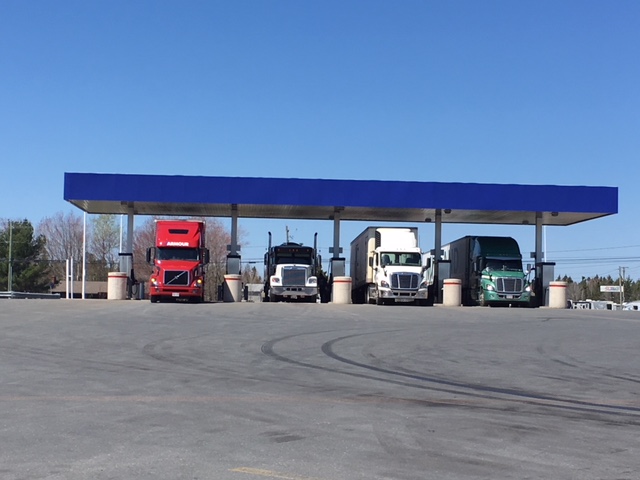Truck drivers and companies across Atlantic Canada are feeling the impact of the Trans-Canada Highway closure between Fredericton and Moncton.

The highways was closed due to water over a section of the road on May 3, and it’s expected to remain closed for several more days.
Truck driver Russell Rowe does several runs between Moncton and Hartland, N.B., every day. He said the detour is adding hours to his trip.
“It’s adding on time taking away from my drive time during the day and just putting kilometres on that are unnecessary,” Rowe said.
He said driving the extra approximate 90 kilometres each way takes more than two hours. Russell said using Highway 7 to Saint John is also much slower because it has less lanes than the Trans-Canada.
“It’s only a two-lane road most of the way, so you get stuck behind somebody going slow, and that’s going to slow you up a bit, getting up those hills,” Rowe said.

Get breaking National news
Driving the extra distance adds up throughout the week, and means not being able to do as many runs. Truck drivers are only permitted to drive 13 hours per day based on industry regulations, and that has to include several breaks.
READ MORE: Flooding forces highway closure between Moncton and Fredericton
- ‘Alarming trend’ of more international students claiming asylum: minister
- Justin Trudeau headed to UN Summit of the Future amid international instability
- Canadian government’s satellite deal has Tories calling for Elon Musk involvement
- Activists call for Boogie the monkey to be removed from Ontario roadside zoo
Atlantic Provinces Trucking Association executive director Jean-Marc Picard said the prolonged closure is starting to be felt across the region.
“Initially it was just going to be for a few days, therefore there were some adjustments to be made to some of the trucking companies,” Picard said. “But now we’re looking at over a week, therefore the operations of some companies will definitely be impacted.”
Picard said he feels for everyone experiencing flooding and recognizes that the road closure doesn’t compare to what many families are going through in flood-stricken areas.
READ MORE: Water begins to recede in flood-soaked parts of New Brunswick: EMO
He said the extra distance means extra fuel costs, having to watch drivers’ hours of service more closely, and possibly having to do less deliveries than normal in a week.
“It’ll be difficult to measure. I mean, obviously some transportation companies have 50 loads a day going through that highway, others might have one a week, so there’s some significant impacts to some companies others it’s a little bit less,” Picard said.
New Brunswick Department of Transportation and Infrastructure Operations executive director Jules Michaud said even once the water recedes, the highway will need to be inspected and debris will need to be removed.
“The highway will re-open following an remedial work that is required to ensure that the highway is safe to accommodate road users,” Michaud said.
Based on preliminary observations ,Michaud said the province anticipates the highway will initially re-open to one lane in each direction.
READ MORE: Floodwaters overwhelm sewage system in Rothesay, N.B.
Picard said the positive thing is that the alternate route is available and that products are at least able to be moved across the country.
“We will adapt. I mean, trucking companies are pretty resourceful by nature. Whether it’s a snow storm or Confederation Bridge closing once in a while for high winds, things like that happen and you learn to maneuver through it,” Picard said.
Rowe said he hopes water levels recede soon so things can return to normal. But for now, he said he’s making the best of it and doing what he needs to do to get the load to its destination.








Comments